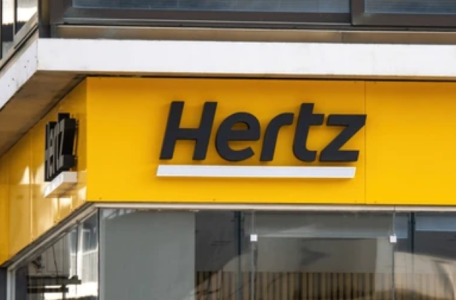New technology raises concerns for customers—here’s what to know
By
Gian T
- Replies 0
If you’ve ever hired a car, you’ll know the drill: a quick walk-around with a clipboard-wielding staff member, a few half-hearted glances at the paintwork, and a signature on a form that you hope won’t come back to haunt you.
But what if, instead of a human, your rental car was inspected by a high-tech artificial intelligence system that never blinks, misses a scratch, and—some say—never gives you the benefit of the doubt?
That’s exactly what’s happening at Hertz, one of the world’s biggest car rental companies, and it’s causing quite a stir among customers.
The company has rolled out a powerful new AI-powered damage-detection system at several major US airports, and the backlash has been swift and vocal.
The technology, developed by a company called UVeye, is a bit like a car wash for data.
As you drive your rental car through the return gate, the system snaps thousands of high-resolution images from every angle.
These images are then analysed by machine learning algorithms, which compare the car’s condition at pick-up and drop-off. If the AI spots any discrepancies—a scratch, dent, or scuff—it automatically generates a damage report.
On paper, this sounds like a win for everyone: no more arguments about whether that scratch was there before, and no more missed damage that could cost the company money.
In fact, Hertz claims that fewer than three per cent of vehicles scanned by the system show any billable damage.
Despite the promise of fairness and transparency, many customers are finding the new system anything but.
Take the case of Patrick, who rented a Volkswagen from Hertz at Atlanta International Airport.
Minutes after returning the car, he received a bill for $US440—$250 for a wheel scratch, $125 for processing, and $65 in admin fees.
The notification came so quickly, it was almost as if the AI was waiting to pounce.
Patrick’s experience isn’t unique. Other renters have taken to social media and forums to share their frustrations.
Some say the AI is too sensitive, flagging up tiny blemishes that could be the result of normal driving, like stone chips or marks from wet weather.
Others complain that the process is impersonal and difficult to dispute. If you want to challenge a charge, you’re directed to a web portal to view before-and-after photos, but there’s no live person to talk to—just a chatbot that can flag your issue for review.
As one social media user put it: ‘In reality, the AI picks up a tiny scuff that isn’t actually there because of the shiny paint and maybe it’s wet out, leaving you to spend months disputing charges for something that is basically just free revenue for the company.’
Many customers feel the new system is less about protecting the company from fraud and more about squeezing extra money from renters.
The instant generation of fees, the lack of human interaction, and the short window for disputing charges all add up to a process that feels more like pressure than transparency.
One commenter summed it up: ‘Their goal isn’t to enhance the rental experience. Their goal is to extract more money from their customers.’
Some have even sworn off Hertz altogether, vowing never to rent from the company again.
At the moment, Hertz is the only major rental company using the UVeye system extensively, and it’s only in the US.
However, UVeye’s technology is already used by big names like General Motors, Hyundai, Amazon, and CarMax, and it’s in place at hundreds of dealerships, fleet locations, and vehicle auctions worldwide.
The company is reportedly in talks with other US rental agencies, so it’s possible we’ll see this technology spread further, and perhaps even make its way to Australia in the future.
There’s no doubt that technology is changing the way we travel, often for the better. But as companies like Hertz embrace AI to streamline their operations, it’s important to make sure that fairness and customer service don’t get left behind.

Have you ever had a dispute over car rental damage? Would you trust an AI system to be fairer than a human inspector, or does this all sound like a recipe for more headaches? We’d love to hear your thoughts and experiences. Share your stories in the comments below.
Read more: Cybercrime hits another major Aussie company—here’s what you need to know
But what if, instead of a human, your rental car was inspected by a high-tech artificial intelligence system that never blinks, misses a scratch, and—some say—never gives you the benefit of the doubt?
That’s exactly what’s happening at Hertz, one of the world’s biggest car rental companies, and it’s causing quite a stir among customers.
The company has rolled out a powerful new AI-powered damage-detection system at several major US airports, and the backlash has been swift and vocal.
The technology, developed by a company called UVeye, is a bit like a car wash for data.
As you drive your rental car through the return gate, the system snaps thousands of high-resolution images from every angle.
These images are then analysed by machine learning algorithms, which compare the car’s condition at pick-up and drop-off. If the AI spots any discrepancies—a scratch, dent, or scuff—it automatically generates a damage report.
On paper, this sounds like a win for everyone: no more arguments about whether that scratch was there before, and no more missed damage that could cost the company money.
In fact, Hertz claims that fewer than three per cent of vehicles scanned by the system show any billable damage.
Despite the promise of fairness and transparency, many customers are finding the new system anything but.
Take the case of Patrick, who rented a Volkswagen from Hertz at Atlanta International Airport.
Minutes after returning the car, he received a bill for $US440—$250 for a wheel scratch, $125 for processing, and $65 in admin fees.
The notification came so quickly, it was almost as if the AI was waiting to pounce.
Patrick’s experience isn’t unique. Other renters have taken to social media and forums to share their frustrations.
Some say the AI is too sensitive, flagging up tiny blemishes that could be the result of normal driving, like stone chips or marks from wet weather.
Others complain that the process is impersonal and difficult to dispute. If you want to challenge a charge, you’re directed to a web portal to view before-and-after photos, but there’s no live person to talk to—just a chatbot that can flag your issue for review.
As one social media user put it: ‘In reality, the AI picks up a tiny scuff that isn’t actually there because of the shiny paint and maybe it’s wet out, leaving you to spend months disputing charges for something that is basically just free revenue for the company.’
Many customers feel the new system is less about protecting the company from fraud and more about squeezing extra money from renters.
One commenter summed it up: ‘Their goal isn’t to enhance the rental experience. Their goal is to extract more money from their customers.’
Some have even sworn off Hertz altogether, vowing never to rent from the company again.
At the moment, Hertz is the only major rental company using the UVeye system extensively, and it’s only in the US.
However, UVeye’s technology is already used by big names like General Motors, Hyundai, Amazon, and CarMax, and it’s in place at hundreds of dealerships, fleet locations, and vehicle auctions worldwide.
The company is reportedly in talks with other US rental agencies, so it’s possible we’ll see this technology spread further, and perhaps even make its way to Australia in the future.
There’s no doubt that technology is changing the way we travel, often for the better. But as companies like Hertz embrace AI to streamline their operations, it’s important to make sure that fairness and customer service don’t get left behind.
Key Takeaways
- Hertz customers have expressed outrage over a new AI-powered damage-detection system, claiming they’ve been unfairly charged for minor or questionable damage identified by the technology.
- The AI scanning system, developed by UVeye, automatically compares high-resolution images of vehicles before and after rental, flagging discrepancies for review and generating immediate damage reports and charges.
- Many renters find it difficult to challenge fees, as customer support is largely limited to a web portal and chatbot, with no live agents available for assistance.
- While the technology is currently only used widely by Hertz in the US, its potential rollout to other agencies and markets remains unclear, including whether it will be introduced to Hertz rentals in Australia.
Read more: Cybercrime hits another major Aussie company—here’s what you need to know








